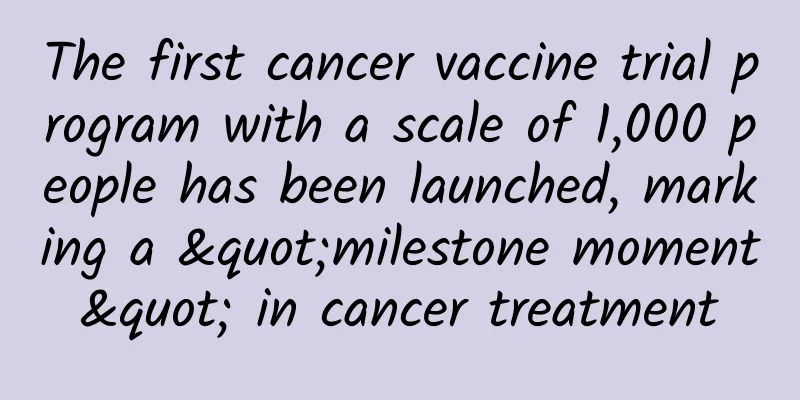The first cancer vaccine trial program with a scale of 1,000 people has been launched, marking a "milestone moment" in cancer treatment

|
Humanity may have taken a big step towards curing cancer, and this time the protagonist is a cancer vaccine. The UK National Health Service is launching a large-scale program to recruit thousands of cancer patients across the country and quickly include them in clinical trials of cancer vaccines through matching. This is the first such program in the world. The current launch program has already included dozens of cancer patients. Cancer vaccines, with their extremely strong specificity, can precisely target cancer cells without harming innocent cells; they can also allow the patient's immune system to remember the characteristics of cancer cells, which is expected to provide patients with lasting protection and prevent cancer recurrence. For patients, this is a "milestone moment." Written by | Mumu Cancer is one of the leading causes of death worldwide, killing millions of people each year. Despite advances in medical technology, common cancer treatments such as surgery, chemotherapy, and radiotherapy still have many limitations and side effects. In recent years, an innovative technology that aims to provide a permanent cure for cancer has emerged, which can stimulate the human immune system to identify and attack cancer cells while also preventing cancer from recurring. This is the cancer vaccine, which is called a "game changer" in the field of cancer treatment. Recently, the UK National Health Service (NHS) launched a groundbreaking personalized cancer vaccine clinical study, also known as the "matchmaking" program, which aims to tailor a cancer vaccine for each patient. The vaccine can be prepared in just a few weeks and guides the patient's own immune system to find and kill cancer cells. According to the research team, patients who meet the screening criteria and agree to undergo blood tests and cancer tissue sample analysis will have the opportunity to immediately participate in this world-first program, which will give many patients a glimmer of new hope in cancer treatment. Game Changer Cancer vaccines, a breakthrough technology in the field of cancer prevention, aim to fight cancer cells by stimulating the body's own immune system, especially T cells. As we all know, T cells are key immune cells in the immune system responsible for identifying and eliminating abnormal cells. Usually, we use vaccination to stimulate and enhance the function of immune cells so that they can prevent and treat specific pathogens. The same is true for cancer vaccines, which can be divided into preventive vaccines and therapeutic vaccines. Preventive vaccines are designed to prevent cancers caused by certain viral infections, such as HPV vaccines for the prevention of cervical cancer; therapeutic vaccines target already occurring tumors to help the immune system recognize and attack cancer cells. However, unlike vaccines for other diseases, an important goal of cancer vaccines is to overcome the immunosuppression in the tumor microenvironment (TME). There are a large number of immunosuppressive cells and molecules in the TME, such as regulatory T cells (Tregs), myeloid-derived suppressor cells (MDSCs), and inhibitory cytokines (such as TGF-β, IL-10), which can inhibit the anti-tumor response of the immune system. Therefore, by vaccinating with cancer vaccines, the activity of effector T cells can be enhanced, the influence of immunosuppressive cells can be reduced, and the TME can be improved, which is more conducive to the immune system attacking cancer cells. In addition, cancer vaccines can also enhance the immune response through the phenomenon of "antigen expansion". The so-called "antigen expansion" means that after the initial vaccination, the immune system will not only respond to the target antigen, but also recognize and attack other tumor antigens, further expanding the breadth and intensity of the immune response. Compared with traditional chemotherapy and radiotherapy, cancer vaccine technology has shown remarkable advantages. First, it is highly specific and can accurately target cancer cells without harming the surrounding normal cells, greatly reducing the side effects of treatment; second, after vaccination, the immune system will remember the characteristics of cancer cells, which is expected to provide patients with more lasting protection and prevent the recurrence of cancer; thirdly, cancer vaccines can achieve personalized treatment and provide tailored treatment plans by identifying and targeting each patient's unique cancer cell mutations; in addition, cancer vaccines can also work synergistically with other treatments to enhance the overall treatment effect and bring patients greater hope of survival. Cancer vaccines not only show great potential in prolonging patient survival, but also can significantly improve patients' quality of life. Unlike traditional chemotherapy and radiotherapy, cancer vaccines have fewer side effects, and patients can maintain a better quality of life during treatment. Therefore, with the deepening of research in recent years, cancer vaccines have shown a glimmer of hope for human cancer cure in many basic studies. Personalized Tumor Vaccine Trial Program Regarding the launch of this large-scale clinical study of personalized tumor vaccines, NHS director Amanda Pritchard believes that this is a "milestone moment" for patients. The NHS has recruited dozens of patients to participate in the cancer vaccine launch program, and plans to recruit thousands of patients at 30 NHS sites across England. The first batch of patients will focus on colorectal cancer, skin cancer, lung cancer, bladder cancer, pancreatic cancer and kidney cancer, and will be expanded to other types of cancer in the future. Ian Fox, executive director of research and innovation at Cancer Research UK, said it was "very exciting" that patients would be able to get personalised vaccinations, and that this development would be a "game changer" in the fight against cancer. He stressed: "Clinical trials like this are vital to helping more people live longer, live better and be free from the fear of cancer." The first NHS patient to join the cancer vaccine research program is Elliot Pfebve. The 55-year-old lecturer at Coventry University was in good health, but was diagnosed with colorectal cancer during a routine health check by his GP. For this, he underwent tumor removal surgery, removed 30 cm of large intestine, and received chemotherapy. He then received this personalized cancer vaccine at the University Hospital Birmingham NHS Foundation Trust. “Participating in this trial was a very important decision in my life, for me and my family,” Pfebve said. “After going through the difficulty of a diagnosis and debilitating chemotherapy, it feels great to be part of a trial that could lead to new cancer treatments, and it would be even better if others could benefit from the trial’s findings.” An interesting point is that the vaccine is designed using the same mRNA vaccine technology as the Pfizer/BioNTech COVID-19 vaccine. Among the cutting-edge directions of vaccine research and development today, DNA vaccines and RNA vaccines have attracted much attention due to their unique advantages. DNA vaccine technology introduces DNA sequences encoding specific tumor antigens into host cells, causing the cells to express these antigens, thereby triggering an immune response. Its high stability, convenience of large-scale production, and ability to encode multiple antigens provide a new approach for tumor immunotherapy. However, the delivery efficiency and expression level of DNA vaccines still need to be improved. RNA vaccines use mRNA molecules to be directly translated into antigenic proteins in the body, thereby efficiently inducing immune responses. The fact that RNA vaccines do not need to enter the cell nucleus also gives them high expression efficiency, and the production process is simple and fast, making them particularly suitable for dealing with diseases such as tumors with rapidly changing mutation spectra (similar to the rapid mutation of the new coronavirus). However, RNA has low stability, so it needs to be protected and delivered with the help of carriers such as lipid nanoparticles to ensure its effectiveness and safety. In the field of cutting-edge vaccine research and development, there is another innovative approach - synthetic long peptide (SLP) vaccine. It uses synthetic long peptides and introduces them into the body through an in vivo delivery system. These long peptides contain multiple T cell epitopes that can activate CD4+ and CD8+ T cells at the same time, inducing a strong immune response. The advantage of SLP vaccines is that they are highly specific and customizable, and can be designed according to the patient's tumor-specific mutations. However, SLP vaccines are expensive to produce and also require a precise delivery system to ensure effectiveness. Challenges and new developments Although cancer vaccines have shown great potential in the field of tumor treatment, their development and application are still full of complex and arduous challenges. These challenges not only involve how to select appropriate antigens, but also include coping with the immune escape mechanism of tumor cells, improving the tumor microenvironment, and optimizing the vaccine delivery platform. Despite these challenges, the field of cancer vaccines is still developing rapidly. With the continuous advancement of science and technology, especially the emergence of new technologies and new tools, many challenges and problems are being overcome bit by bit. For example, with the rapid development of next-generation sequencing technology, by sequencing the patient's tumor DNA and RNA, the patient's tumor gene mutation can be quickly and accurately identified, and then the corresponding vaccine can be designed. The success of therapeutic cancer vaccines depends largely on the nature of the antigens in the vaccine, especially the discovery of more potential new antigens. New antigens are protein fragments produced due to tumor gene mutations, which are different from the proteins expressed in normal cells, so the immune system can recognize them as foreign substances. For another example, the continuous advancement of new delivery platforms, especially the development of new nanoparticles and self-assembled microparticles, provides more effective means of delivery for cancer vaccines. New delivery platforms are an important part of the development of vaccine platforms. Traditional vaccine delivery methods may not be able to effectively deliver vaccine components to target sites, such as lymph nodes or tumor microenvironments. The new delivery platform is a non-cellular particle smaller than a cell, usually called a "nanoparticle" (size range of 20-100 nanometers). Scientists are exploring the use of them as carriers to improve non-cellular protein or peptide-based therapeutic cancer vaccine platforms. Such methods include liposome delivery, amphiphilic (Amph) vaccines, liposomes, and new self-assembled nanoparticles (composed of TLR7/8-SLP neoantigen conjugates (SNP-7/8a)). In addition, the polyethyleneimine silicon microrod (MSR) vaccine has also been shown to enhance the immunogenicity of HPV-16 E7 and multiple neoantigen peptides, with significant effects in treating existing tumors in mice. In addition, the development of computational biology and bioinformatics in recent years has also made the design of personalized cancer vaccines more feasible. Cancer is a highly heterogeneous disease, and tumors from different patients have different mutation spectra and immune characteristics. Therefore, the idea of personalized cancer vaccines is to design specific antigens and treatment plans based on the specific conditions of each patient. This personalized solution obviously requires the strong support of bioinformatics. In general, therapeutic cancer vaccines have made significant progress in the past few decades. Despite many challenges, with the in-depth understanding of tumor immune mechanisms and the development of new technologies, vaccine design and delivery platforms have been improved. By optimizing antigen selection, enhancing immune response, overcoming immune escape mechanisms, and exploring combination treatment strategies, therapeutic cancer vaccines are expected to become an important part of cancer treatment in the future. Moreover, the research and development of cancer vaccines has also advanced our understanding of the immune system and cancer biology. By studying how cancer vaccines work, scientists are able to gain insight into how the immune system recognizes and attacks cancer cells, and how tumors evade immune surveillance. This knowledge will not only help develop more effective cancer vaccines, but can also be applied to other types of immunotherapy. We have reason to believe that as research continues to deepen, cancer vaccines will become an important weapon in the fight against cancer, bringing hope for humanity's victory over this major disease. Special Tips 1. Go to the "Featured Column" at the bottom of the menu of the "Fanpu" WeChat public account to read a series of popular science articles on different topics. 2. Fanpu provides a function to search articles by month. Follow the official account and reply with the four-digit year + month, such as "1903", to get the article index for March 2019, and so on. Copyright statement: Personal forwarding is welcome. Any form of media or organization is not allowed to reprint or excerpt without authorization. For reprint authorization, please contact the backstage of the "Fanpu" WeChat public account. |
>>: A new generation of manned lunar rocket is here! The latest progress of Long March 10 →
Recommend
90% of skin problems are caused by something, come and see if you are one of them?
How come my face becomes sensitive? Whenever this...
Out of control body - Is "obsessive compulsive disorder" really a disease? How to deal with obsessive compulsive disorder?
Author: Xu Wei, Zhongda Hospital Affiliated to So...
The Double Eleven War is about to start. What are the routines and methods of JD.com and Alibaba?
While waiting for the arrival of this year’s Doub...
What’s the matter with the 11.2 billion yuan refund for job retention? Which companies can apply? How to apply? Attached is the application process!
What’s the matter with the 11.2 billion yuan refu...
How to let users quickly understand new products? (Attached with 6 creative templates)
In 1994, Bill Gates sat on 330,000 pieces of pape...
One person's business, from 0 to 1, the system solves the problem of making money for individuals
One person's business, from 0 to 1, the syste...
Living room economy is outdated, home appliance companies are trying to grab a piece of the kitchen economy pie
After the policy dividends were withdrawn, due to...
June 2023 "Science" Rumor List: Is heat stroke the same as heat stroke? Can mineral water exposed to the sun in a car cause cancer?
The list of "scientific" rumors for Jun...
How to make an African blessing video, is the African birthday blessing video real?
A blackboard and a dozen African children shouted...
How much does it cost to join a ticketing app in Liaoyuan?
For entrepreneurs, although mini program developm...
7 essential skills for operators - Business analysis is the highest level of operator ability
1. What is business analysis capability? Business...
China Automobile Dealers Association: Analysis of China's imported automobile market in September 2022
Customs import volume (I) Supply: After three yea...
One picture to understand | Fly × 16! See the journey of Shenzhou flying into space
Produced by: People's Daily x Dongdongmiao...
Android alternatives: Top 8 mobile operating systems in 2019, which one do you think is better?
There is no doubt that Android is a very popular ...
Are colored luxury salts more natural and healthier?
Recently, several reporters asked: Are those salt...









